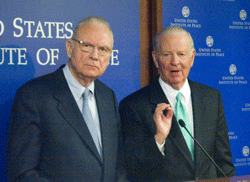
In a candid moment near the start of the Iraq War (pre-civil, civil or post-civil), then Secretary of State Colin Powell told President Bush exactly what the Iraq Study Group has now reminded him three years later. We broke Iraq and now we own the problem. We have been paying, of course, all along in lives and billions of dollars that might have served a useful purpose rather than taking more lives. Now encoded in mediaspeak as the “Pottery Barn rule,†the label sticks even though the commercial Pottery Barn does not have such a rule. The fact that the situation in Iraq is “grave and deteriorating,†as the Iraq Study Group bluntly states, shows that the current war and occupation have indeed gone to pot. Leave it to ten former politicians and continuing public personas to hash[ish] it out and exhume the failed policy for all to see.
Maybe it is time to let Pottery Barn off the hook, now that Taco Bell has introduced its new E. coli line. The rule, however, has a long history. As a child I often accompanied my father on his annual trips to New England to visit Antique shops, looking for the Edison phonographs which became his lifelong hobby. This was back in the days when Antique shops actually sold antiques and not left-over garage sale rejects. Many of these entrepreneurial oases were in old wooden sheds or barns, sometimes so tightly packed with heirlooms that you could hardly move through an aisle. Particularly popular were the glass dishes and I remember the frequently placed hand-made signs that read: “You break it, you own it.†Being a book lover, I had no interest in picking up a salt cellar or a depression-era serving dish. But the principle seemed fair and logical to me at the time. There was a time in this country when responsibility was more than a perpetually unfilled campaign slogan.
As the report of the Iraq Study Group illustrates through its oh-is-this-obvious list of recommendations, Iraq is broken and the will of the American people to continue a war that has no end in sight is clearly near the breaking point. But this report is not about responsibility and certainly not based on more than a superficial understanding of the crises throughout the Middle East. James Baker and Lee Hamilton are not so much picking up the broken pieces, but trying to heal the gash wounds in the face of the current foreign policy towards Iraq and the entire region. Colin Powell did not go far enough with his Pottery Barn rule; the Bush-Blair War on Terror via Iraq is more aptly described as “bull in the china shop.†The neocons supplied the “bull†(the idea that we need to force pro-American democracy down Iraq’s throat) and then drove the herd rawhide style into the cradle of civilization. The patriotic stampede made for good Fox cinema, but now what is supposed to happen?
The full report now available on the web offers 79 specific recommendations, from the blatantly obvious to the small-step variety. Many of these have been commented upon in the main media, but I wish to draw attention to #77 and #78. Both of these are directed at the Director of National Intelligence and the Secretary of Defense. In the first these two principal (and hopefully principled) players should “devote significantly greater analytic resources to the task of understanding the threats and sources of violence in Iraq.†In less diplomatic terms the advice boils down to having viable assessment of who is causing the problem and why. Not only has this administration erred in underestimating the resistance to occupation, but the Rumsfeld-Cheney team has not even properly identified why people are angry. The second recommendation is to change the way data are collected in order to “provide a more accurate picture of events on the ground.†But this misses the mark in trying to politely let President Bush get off the hot seat and still maintain some cool. The problem is not in getting the data but interpreting it. The sad case of Colin Powell citing known spurious information at the U.N. or President Bush incorporating suspect intelligence about yellowcake into a State of the Union address is not about methods of collecting. The failure was in the policy makers who picked only what they wanted to hear.
The Iraqi Study Group offers a fig leaf for the lame duck Emperor with No Closure. But instead of debating what we might have to pay inside a Pottery Barn store, it might be best to take the people who got us into this mess out behind the barn (even if it is full of antiques) and apply some of that Law-West-of-the-Pecos punishment, at least rhetorically, the man from Texas brags about.
Daniel Martin Varisco